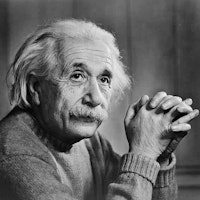If I were not a physicist, I would probably be a musician. I often think in music. I live my daydreams in music. I see my life in terms of music.
Albert Einstein

Life in Terms of Music
Topic: Creativity, Culture, & the Arts
If I were not a physicist, I would probably be a musician. I often think in music. I live my daydreams in music. I see my life in terms of music… I get most joy in life out of my violin.
Albert Einstein, born on 14 March 1879 and passing away on 18 April 1955, stands as one of the most renowned theoretical physicists in history. Best known for his groundbreaking special and general theories of relativity, his scientific endeavors spanned a multitude of areas within the field of physics. Amongst his numerous accolades, he was awarded the Nobel Prize in physics for his elucidation of the photoelectric effect—a phenomenon that expanded the horizons of quantum theory.
Einstein's journey, however, wasn't merely defined by scientific discoveries, but by the myriad challenges he overcame across various dimensions of his life. In his spiritual journey, he grappled with the concepts of God and universe. Socially, he navigated the complexities of his time—facing the rise of anti-Semitism, experiencing exile from his homeland due to Nazi oppression, and advocating for civil rights, disarmament, and global peace. These adversities only strengthened his resolve and underscored his resilience.
Beyond his professional accomplishments, Einstein's life was enriched by a tapestry of relationships and dialogues with luminaries from diverse fields. He engaged in profound conversations on the nature of reality with the likes of the Indian poet Rabindranath Tagore, discussed the principles of non-violence with Mohandas Gandhi, and deliberated on humanitarian issues with Albert Schweitzer. Furthermore, his camaraderie with fellow scientists and physicists provided a fertile ground for intellectual exchanges, fostering an environment of collaboration and innovation during one of the most exciting epochs in scientific history.
Einstein, Albert. "What Life Means to Einstein." Interview by G.S. Viereck. *Saturday Evening Post*, 1929.

Albert Einstein
Theme: The Musical Arts

About This Albert Einstein Quotation [Commentary]
Albert Einstein’s statement, “If I were not a physicist, I would probably be a musician,” offers a revealing glimpse into the way he understood himself. Though celebrated for his scientific mind, Einstein saw music as an essential part of his life—so integral that he imagined it as his alternate path. “I often think in music,” he wrote, suggesting that music shaped his inner thinking. Rather than separating the disciplines, Einstein allowed them to inform each other, with musical thought accompanying scientific insight.
His words, “I live my daydreams in music. I see my life in terms of music,” show how music framed not just thought, but also feeling and imagination. Music became a way of experiencing the world and understanding the movement of life. In speaking this way, Albert Einstein brings attention to the musical arts as a way of sensing patterns, meaning, and flow. The rhythms of music offered him a structure for reflection and a way of moving through complexity.
When he wrote, “I get most joy in life out of my violin,” Einstein made clear that music was not a passing interest but a steady presence. His violin, often played in solitude or shared among friends, gave him emotional clarity and ease. The joy he found in playing music echoed through his daily life, shaping both his spirit and his work. In his words, music was not just sound—it was a way of living.
Albert Einstein’s Lifelong Love of Music [Brief Commentary]
Einstein’s initial introduction to music through violin lessons at age six, encouraged by his pianist mother, began as a dutiful chore. Yet, at thirteen, his discovery of Mozart’s violin sonatas ignited a profound love for music. He described Mozart’s music as a “reflection of the inner beauty of the universe,” marking a pivotal moment where music evolved from an obligation to a passion deeply intertwined with his life’s work. His admiration for the clarity and structural beauty in the works of Mozart and Bach paralleled his quest for simplicity and harmony in his scientific theories, illustrating how his musical preferences reflected and influenced his scientific thought process. This connection between music and science in Einstein’s life highlights the depth and diversity of his intellectual and emotional landscape.
The joy Einstein derived from his violin, named Lina, illustrates music’s significant role in his life. It wasn’t merely a source of entertainment but a companion that provided emotional solace and a unique form of expression. This personal connection to music reflects the broader idea that fulfillment often comes from deeply personal and passionate endeavors.
Resources
Related Quotes
Copyright © 2017 – 2026 LuminaryQuotes.com About Us